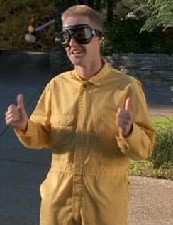The Press and Serving the Public Interest
I think the most disturbing thing about this episode is the implication by Bill Keller and others in the press that "we the people" just need to trust them. I'm a little reluctant to trust my elected officials much less a private citizen who has done much less to get into such a position of power and influence.
Jeff Jarvis makes a great point about the lack of journalistic standards and transparency in the media:
"I want to see the editor of a major U.S. newspaper who is covering and uncovering classified government antiterrorism programs write a piece under the headline: “When and why I will reveal secrets.” For I have not yet seen a satisfactory answer to that obvious and essential question in any of the many letters and editorials those editors have been writing lately. If journalism is about upholding standards, then let’s know what those standards are."It is rather ironic that the media usually shouts from the mountaintops about the need for more transparency in business or government but is loathe to allow such a thing in their own house.
Of course the bigger concern is whether or not the media is serving the public interest by publishing classified information, especially during a war. During this week's Journal Editorial Report, Paul Gigot of the Wall Street Journal asks Marvin Kalb of the Jones Shorenstein Center on the Press and Politics and Public Policy whether stories like this latest one from the New York Times will put people in danger. Kalb responds:
"But I can tell you, flat out, that most journalists are very respectful of the rights, of the needs, of the soldiers. They are not going to run anything that they think is going to harm the American people or the American troops. I think we all know that."I'd like to believe that, but I'm not sure that I would agree with Kalb that "we all know that". I am reminded of an old article in The Atlantic Monthly that James Fallows wrote entitled "Why Americans Hate the Media". Fallows begins his article with a description of a public television series in the late '80s called "Ethics in America".
The episode was taped in the fall of 1987. Its title was "Under Orders, Under Fire," and most of the panelists were former soldiers talking about the ethical dilemmas of their work. The moderator was Charles Ogletree, a professor at Harvard Law School, who moved from panelist to panelist asking increasingly difficult questions in the law school's famous Socratic style.During the first half of the show Ogletree made the soldiers squirm about ethical tangles on the battlefield....
...Then Ogletree turned to the two most famous members of the evening's panel, better known even than Westmoreland. These were two star TV journalists: Peter Jennings, of World News Tonight and ABC, and Mike Wallace, of 60 Minutes and CBS.
Ogletree brought them into the same hypothetical war. He asked Jennings to imagine that he worked for a network that had been in contact with the enemy North Kosanese government. After much pleading Jennings and his news crew got permission from the North Kosanese to enter their country and film behind the lines. Would Jennings be willing to go? Of course, he replied. Any reporter would—and in real wars reporters from his network often had.
But while Jennings and his crew were traveling with a North Kosanese unit, to visit the site of an alleged atrocity by U.S. and South Kosanese troops, they unexpectedly crossed the trail of a small group of American and South Kosanese soldiers. With Jennings in their midst the Northern soldiers set up an ambush that would let them gun down the Americans and Southerners.
What would Jennings do? Would he tell his cameramen to "Roll tape!" as the North Kosanese opened fire? What would go through his mind as he watched the North Kosanese prepare to fire?
Jennings sat silent for about fifteen seconds. "Well, I guess I wouldn't," he finally said. "I am going to tell you now what I am feeling, rather than the hypothesis I drew for myself. If I were with a North Kosanese unit that came upon Americans, I think that I personally would do what I could to warn the Americans."
Even if it meant losing the story? Ogletree asked.
Even though it would almost certainly mean losing my life, Jennings replied. "But I do not think that I could bring myself to participate in that act. That's purely personal, and other reporters might have a different reaction."
Ogletree turned for reaction to Mike Wallace, who immediately replied. "I think some other reporters would have a different reaction," he said, obviously referring to himself. "They would regard it simply as another story they were there to cover." A moment later Wallace said, "I am astonished, really." He turned toward Jennings and began to lecture him: "You're a reporter. Granted you're an American" (at least for purposes of the fictional example; Jennings has actually retained Canadian citizenship). "I'm a little bit at a loss to understand why, because you're an American, you would not have covered that story."
Ogletree pushed Wallace. Didn't Jennings have some higher duty to do something other than just roll film as soldiers from his own country were being shot?
"No," Wallace said flatly and immediately. "You don't have a higher duty. No. No. You're a reporter!"
Interestingly enough, Newt Gingrich summed up the discussion quite well:
"The military has done a vastly better job of systematically thinking through the ethics of behavior in a violent environment than the journalists have."










<< Back to Dignan's 75 Year Plan